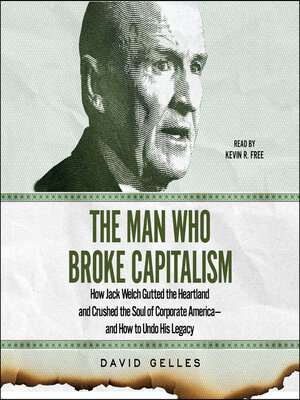The Man Who Broke Capitalism
audiobook (Unabridged) ∣ How Jack Welch Gutted the Heartland and Crushed the Soul of Corporate America—and How to Undo His Legacy
By David Gelles

Sign up to save your library
With an OverDrive account, you can save your favorite libraries for at-a-glance information about availability. Find out more about OverDrive accounts.
Find this title in Libby, the library reading app by OverDrive.



Search for a digital library with this title
Title found at these libraries:
| Library Name | Distance |
|---|---|
| Loading... |
New York Times Bestseller
New York Times reporter and "Corner Office" columnist David Gelles reveals legendary GE CEO Jack Welch to be the root of all that's wrong with capitalism today and offers advice on how we might right those wrongs.
In 1981, Jack Welch took over General Electric and quickly rose to fame as the first celebrity CEO. He golfed with presidents, mingled with movie stars, and was idolized for growing GE into the most valuable company in the world. But Welch's achievements didn't stem from some greater intelligence or business prowess. Rather, they were the result of a sustained effort to push GE's stock price ever higher, often at the expense of workers, consumers, and innovation. In this captivating, revelatory book, David Gelles argues that Welch single-handedly ushered in a new, cutthroat era of American capitalism that continues to this day.
Gelles chronicles Welch's campaign to vaporize hundreds of thousands of jobs in a bid to boost profits, eviscerating the country's manufacturing base, and destabilizing the middle class. Welch's obsession with downsizing—he eliminated 10% of employees every year—fundamentally altered GE and inspired generations of imitators who have employed his strategies at other companies around the globe. In his day, Welch was corporate America's leading proponent of mergers and acquisitions, using deals to gobble up competitors and giving rise to an economy that is more concentrated and less dynamic. And Welch pioneered the dark arts of "financialization," transforming GE from an admired industrial manufacturer into what was effectively an unregulated bank. The finance business was hugely profitable in the short term and helped Welch keep GE's stock price ticking up. But ultimately, financialization undermined GE and dozens of other Fortune 500 companies.
Gelles shows how Welch's celebrated emphasis on increasing shareholder value by any means necessary (layoffs, outsourcing, offshoring, acquisitions, and buybacks, to name but a few tactics) became the norm in American business generally. He demonstrates how that approach has led to the greatest socioeconomic inequality since the Great Depression and harmed many of the very companies that have embraced it. And he shows how a generation of Welch acolytes radically transformed companies like Boeing, Home Depot, Kraft Heinz, and more. Finally, Gelles chronicles the change that is now afoot in corporate America, highlighting companies and leaders who have abandoned Welchism and are proving that it is still possible to excel in the business world without destroying livelihoods, gutting communities, and spurning regulation.
New York Times reporter and "Corner Office" columnist David Gelles reveals legendary GE CEO Jack Welch to be the root of all that's wrong with capitalism today and offers advice on how we might right those wrongs.
In 1981, Jack Welch took over General Electric and quickly rose to fame as the first celebrity CEO. He golfed with presidents, mingled with movie stars, and was idolized for growing GE into the most valuable company in the world. But Welch's achievements didn't stem from some greater intelligence or business prowess. Rather, they were the result of a sustained effort to push GE's stock price ever higher, often at the expense of workers, consumers, and innovation. In this captivating, revelatory book, David Gelles argues that Welch single-handedly ushered in a new, cutthroat era of American capitalism that continues to this day.
Gelles chronicles Welch's campaign to vaporize hundreds of thousands of jobs in a bid to boost profits, eviscerating the country's manufacturing base, and destabilizing the middle class. Welch's obsession with downsizing—he eliminated 10% of employees every year—fundamentally altered GE and inspired generations of imitators who have employed his strategies at other companies around the globe. In his day, Welch was corporate America's leading proponent of mergers and acquisitions, using deals to gobble up competitors and giving rise to an economy that is more concentrated and less dynamic. And Welch pioneered the dark arts of "financialization," transforming GE from an admired industrial manufacturer into what was effectively an unregulated bank. The finance business was hugely profitable in the short term and helped Welch keep GE's stock price ticking up. But ultimately, financialization undermined GE and dozens of other Fortune 500 companies.
Gelles shows how Welch's celebrated emphasis on increasing shareholder value by any means necessary (layoffs, outsourcing, offshoring, acquisitions, and buybacks, to name but a few tactics) became the norm in American business generally. He demonstrates how that approach has led to the greatest socioeconomic inequality since the Great Depression and harmed many of the very companies that have embraced it. And he shows how a generation of Welch acolytes radically transformed companies like Boeing, Home Depot, Kraft Heinz, and more. Finally, Gelles chronicles the change that is now afoot in corporate America, highlighting companies and leaders who have abandoned Welchism and are proving that it is still possible to excel in the business world without destroying livelihoods, gutting communities, and spurning regulation.







